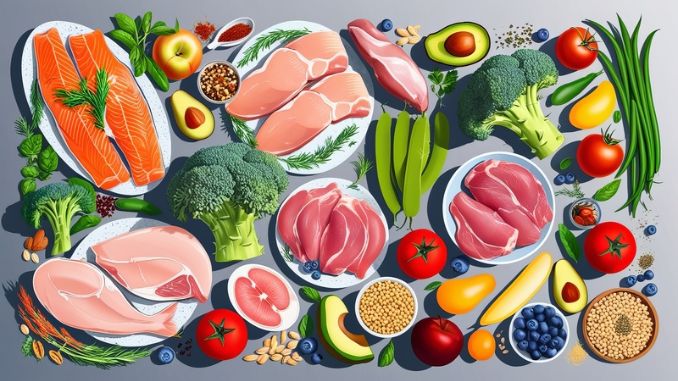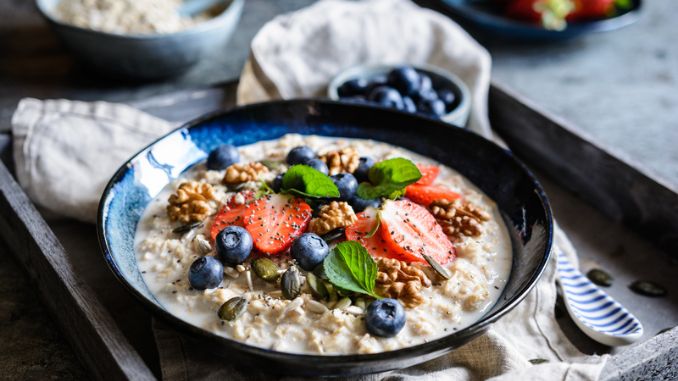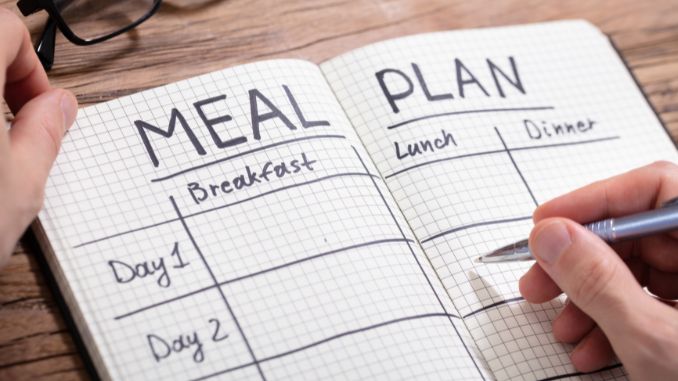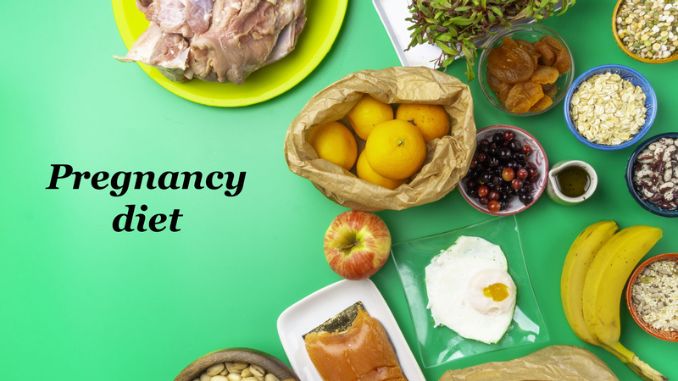In this article, we’ll provide a straightforward 7 day meal plan designed to help manage gestational diabetes, making it simpler to keep blood sugar levels stable during pregnancy.
Disclaimer: Please note that this content is provided for informational purposes only and is not intended as medical guidance. Before initiating any dietary changes, it is recommended to seek advice from a healthcare professional.
Managing gestational diabetes is very important for both the mother’s and baby’s health. Therefore, gestational diabetes [1] happens during pregnancy and can cause problems if not taken care of.
This condition occurs when the body doesn’t make enough insulin, which leads to high blood sugar levels. Therefore, eating the right foods is very important to keep blood sugar levels in check. It’s important to maintain a balanced and nutritious diet.
What Is Gestational Diabetes?

Gestational diabetes develops when the body struggles to produce sufficient insulin to cope with the increased needs of pregnancy, consequently leading to high blood sugar. Common causes include hormonal changes, excess weight, and a family history of diabetes.
Unlike type 1 and type 2 diabetes, which are chronic conditions, gestational diabetes is specific to pregnancy and typically resolves after giving birth. Nevertheless, having gestational diabetes can raise the likelihood of developing type 2 diabetes in the future. To manage blood sugar levels during pregnancy, a carefully planned diet is essential. Below is a 7 day meal plan specifically designed for managing gestational diabetes.
Day 1 : Introduction To the Gestational Diabetes Meal Plan

- Breakfast: Oatmeal with berries and a sprinkle of nuts.
- Snack 1: Greek yogurt with chia seeds.
- Lunch: Grilled chicken with broccoli and a side of quinoa.
- Snack 2: Apple slices with almond butter.
- Dinner: Baked salmon with a side salad of steamed broccoli carrots.
Day 2 : Balanced Meals To Support Blood Sugar Stability

- Breakfast: Whole Grain Toast with Avocado and a Poached Egg.
- Snack 1: Cottage Cheese with Cucumber Slices.
- Lunch: Lentil and Veggie Soup.
- Snack 2: Walnuts and a Small Pear
- Dinner: Stir-fried tofu with mixed vegetables and cooked brown rice.
Day 3 : Nutrient Dense Options For Gestational Diabetes

- Breakfast: Scrambled eggs with sautéed spinach and a slice of whole-grain toast
- Snack 1: Carrot sticks with hummus
- Lunch: Grilled turkey breast with roasted sweet potatoes and steamed green beans
- Snack 2: Cottage cheese with a handful of blueberries
- Dinner: Baked cod with quinoa and a side of roasted brussels sprouts
Day 4 : Filling And Flavorful Meals To Keep You Energized

- Breakfast: Greek yogurt parfait with chia seeds, flaxseeds, and mixed berries
- Snack 1: Handful of almonds and a few cucumber slices
- Lunch: Grilled Chicken with Caesar Salad
- Snack 2: Celery sticks with peanut butter
- Dinner: Turkey meatballs with zucchini noodles and marinara sauce
Day 5 : Low-Carb, High-Protein Choices For Sustained Energy

- Breakfast: Whole-grain English muffins and scrambled eggs
- Snack 1: Cheddar cheese slices with a handful of cherry tomatoes
- Lunch: Tuna salad (made with Greek yogurt) wrapped in lettuce leaves, served with cucumber slices on the side.
- Snack 2: A hard-boiled egg with a few slices of red bell pepper
- Dinner: Baked chicken thighs with roasted cauliflower and a side of wild rice
Day 6 : Fiber-Rich And Protein-Packed Dishes For Blood Sugar Control

- Breakfast: Scrambled eggs with sautéed mushrooms, spinach, and a side of sliced avocado
- Snack 1: Sliced bell peppers with guacamole
- Lunch: Grilled shrimp with a mixed greens salad and a side of farro
- Snack 2: Small handful of mixed nuts and a few raspberries
- Dinner: Turkey chili with black beans, served with a small whole-wheat tortilla
Day 7 : Delicious And Diabetes-Friendly Meals For The Final Day

- Breakfast: Chia pudding (made with unsweetened almond milk and topped with strawberries and walnuts)
- Snack 1: Sliced apple with a tablespoon of sunflower seed butter
- Lunch: Grilled salmon with a side of roasted sweet potatoes and sautéed kale
- Snack 2: Low-fat string cheese and a handful of baby carrots
- Dinner: Ground turkey stuffed bell peppers with brown rice and mixed vegetables
7 Day Meal Plan Overview

Moreover, the 7-day meal plan is structured to help manage gestational diabetes effectively by focusing on consistent meal timing, balanced nutrition, and portion control.
The meal plan consists of three balanced meals and two evenly spaced snacks daily. Moreover, this structure helps prevent blood sugar spikes and keeps energy levels steady throughout the day.
Portion control is key, ensuring that each meal and snack provides the right amount of nutrients without overeating. Timing is also important; eating at regular intervals helps regulate blood sugar and supports metabolic health.
- Breakfast: Start the day with a balanced meal, such as whole-grain toast with boiled egg and avocado or oatmeal topped with nuts and fresh berries. Portion sizes should be moderate, focusing on complex carbohydrates, lean protein, and healthy fats.
- Snack 1: Meanwhile, a light, fiber-rich option like a small apple with a tablespoon of almond butter or a handful of mixed nuts can keep you satisfied between breakfast and lunch.
- Lunch: Opt for a balanced meal that emphasizes vegetables and lean protein. Therefore, a grilled chicken salad with quinoa, mixed greens, and a vinaigrette dressing or a whole-grain wrap filled with turkey, avocado, and veggies are excellent choices. Ensure your portion sizes align with your nutritional needs.
- Snack 2: Combine protein and healthy fats for sustained energy, such as Greek yogurt with a few slices of cucumber or hummus with carrot sticks.
- Dinner: Choose filling yet light options that focus on fibers, lean proteins, and complex carbohydrates, such as sweet potato and black beans, which make them a great option for providing sustained energy and helping to regulate blood sugar levels. Moreover, examples include baked salmon with roasted vegetables and brown rice or a stir-fry with tofu, broccoli, and whole-grain noodles. Portion control remains important to avoid overeating late in the day.
Why Having A Diet Matters
Diet is crucial in managing gestational diabetes because blood sugar levels directly impact both the mother’s and baby’s health during pregnancy. Elevated blood sugar levels can result in Gestational Diabetes such as excessive preterm birth, baby’s birth weight, and increased risk of developing type-2 diabetes later on.
Carbohydrates, proteins, and fats play specific roles in controlling blood sugar levels. Moreover, carbohydrates are the main source of glucose, so consuming complex carbs with a low glycemic index can help maintain stable blood sugar.
“Some examples of food with a low glycemic index that can help maintain blood sugar levels are quinoa, lentils, carrots, kale, apples, and oranges. Additionally, these are just a few of the many options available.”
Additionally, fats and proteins help to slow down the absorption of sugar into the bloodstream, further assisting in blood sugar control. For fats and proteins, here are some of the foods that are recommended: avocado, nuts, salmon, sardines, eggs, chicken or turkey breasts.
A balanced diet that carefully manages these nutrients is essential for keeping blood sugar levels healthy throughout pregnancy. Additionally, practicing portion control is equally important to avoid overeating and to manage blood sugar levels effectively, ensuring a healthy pregnancy.
Gestational Diabetes Diet Guidelines For Key Nutrients
1. Carbohydrate Management
It’s very crucial because the type and amount of carbohydrates you consume directly affect blood sugar levels. Additionally, complex carbohydrates, like those found in whole grains, legumes, and vegetables, are digested more slowly than simple carbohydrates, helping to prevent rapid spikes in blood sugar.
It’s important to monitor your daily carbohydrate intake and adhere to recommended portion sizes to keep glucose levels in check.
2. Protein For Sustainable
Protein plays a vital role in a gestational diabetes meal plan. Lean proteins [2] support muscle health and contribute to satiety, while healthy fats are important for overall well-being and also help to stabilize blood sugar.
Moreover, including lean protein in each meal not only supports muscle health but also helps maintain stable blood sugar levels by slowing down the absorption of carbohydrates. Excellent sources of protein include chicken, fish, tofu, and legumes.
- Healthy Fats
Furthermore, these are another key component, as they aid in stabilizing blood sugar and provide essential nutrients for both mother and baby.
Incorporating sources of healthy fats, such as nuts, avocados, and olive oil, into your meals can help improve blood sugar control and contribute to overall well-being.
- Fiber For Digestive Health
It’s also essential in managing gestational diabetes. Fiber slows down the digestion and absorption of carbohydrates, which helps maintain stable blood sugar levels.
Moreover, high-fiber foods, such as whole grains, beans, and vegetables, should be a regular part of your diet to support digestive health and blood sugar management.
Tips For Success
- Meal Prep And Planning: Meal planning can help you ensure that healthy options are readily available. Additionally, it can allow you to be mindful of the portion sizes, preventing overeating and subsequent spike in blood sugar. Set aside time to create a meal plan and prepare meals in advance.
Moreover, batch cooking is a great way to save time and ensure you always have healthy meals prepared. For example, cook quinoa, grilled chicken, or roasted vegetables in large batches that you can use throughout the week. Store meals in airtight containers and freeze portions for later use to avoid the temptation of unhealthy choices when time is tight. - Grocery Shopping Tips: A well-organized shopping list is your best tool for making healthy choices. Then, plan your weekly grocery list around your meal plan, focusing on fresh vegetables, lean proteins, whole grains, and healthy fats. When shopping, choose fresh produce by looking for vibrant colors and firmness.
Opt for whole grains like quinoa, brown rice, and oats, and pick lean protein sources such as chicken, turkey, and plant-based options like beans and tofu. Meanwhile, avoid processed and high-sugar foods by sticking to the store’s outer aisles, where fresh, whole foods are typically found. - Staying Hydrated: Furthermore, proper hydration is critical for managing blood sugar levels. Drinking water throughout the day helps regulate glucose and supports overall health during pregnancy.
Aim for at least 8-10 glasses of water per day. You can also have herbal teas, such as peppermint or ginger tea, which are gestational diabetes-friendly and caffeine-free. Avoid sugary drinks, sodas, and fruit juices, as these can cause blood sugar spikes.
Conclusion
Diet plays a crucial role in managing gestational diabetes and ensuring a healthy pregnancy for both mother and baby.
Although it might not prevent gestational diabetes, by focusing on balanced meals that incorporate lean proteins, complex carbohydrates, and healthy fats, you can maintain stable blood sugar levels to suppress it.
The 7-day healthy diet meal plan provides a structured approach to help manage gestational diabetes with nutrient-dense and easy-to-prepare meals.
Additionally, it’s important to work closely with your healthcare provider or a registered dietitian to tailor this plan to your specific needs. Every pregnancy is unique, and personalized guidance will ensure you’re getting the right nutrition for you and your baby.
Struggling to manage your blood sugar? The 14-Day Diabetes Control Quick Start Program is here to help! Our easy-to-follow guide offers practical tips, proven strategies, and meal plans to get your diabetes under control.


Rick Kaselj MS, is a leading kinesiologist and injury specialist as well as co-creator of the best-selling Unlock Your Hip Flexors program. Rick creates exercise programs that help people heal injuries and eliminate pain, so they can go back to living a full, active, healthy life.



